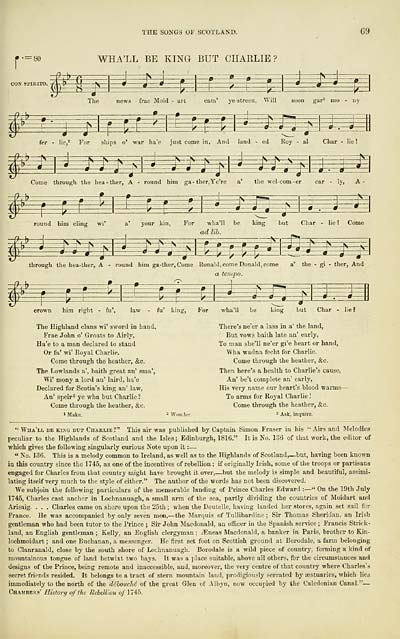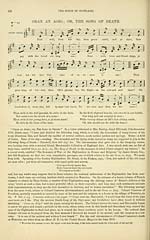Glen Collection of printed music > Printed music > Wood's edition of the songs of Scotland
(93) Page 69 - Wha'll be king but Charlie
Download files
Complete book:
Individual page:
Thumbnail gallery: Grid view | List view

THE SONGS OF SCOTLAND.
G9
• = 80
UON SP1R1TO.
^
WHA'LL BE KING BUT CHARLIE?
I !
fc£
£E£E£
zw=i
:>
£^e*
i=P
The news frae Moid - an cam' ye-streen, Will soon gar 1 mo - ny
^ e — f >< 1- — R — ! — * -J — d —
ES
-■ * — *-
fer - lie, 2 For ships o' war lia'e just come in, And land - ed Roy - al Char - lie !
fat
3F:
^=^^
3^S
J N
M^g£
*
Come through the hea-ther, A - round him ga- ther,Ye're a' the wel-com-er ear - ly, A>
&±
S^
=£
• 7
< » — ^-
round him cling wi'
!^3£s|d=£
a' your kin, For wha'll be king but Char - lie ? Come
ad lib.
m
tr
?
±=?C
-F— •— F— »-
\—\
«=fc
±=3t=j
I
through the hea-ther, A - round him ga-ther, Come Ronald, come Donald, come a' the - gi - ther, And
a tempo.
1 > "^-rV^
s
P5
9
crown him right - fu', law - fu' king, For wha'll be king but Char - lie?
The Highland clans wi' sword in hand,
Frae John o' Groats to Airly,
Ha'e to a man declared to stand
Or fa' wi' Royal Charlie.
Come through the heather, &c.
The Lowlands a', baith great an' sma',
Wi' mony a lord an' laird, ha'e
Declared for Scotia's king an' law,
An' speir 3 ye wha but Charlie?
Come through the heather, &c.
i Make.
There's ne'er a lass in a' the land,
But vows baith late an' early,
To man she'll ne'er gi'e heart or hand,
Wha wadna fecht for Charlie.
Come through the heather, &c.
Then here's a health to Charlie's cause,
An' be't complete an' early,
His very name our heart's blood warms-
To arms for Royal Charlie !
Come through the heather, &c.
8 Ask, inquire.
" Wha'll de kino but Charlie?" This air was published by Captain Simon Fraser in his " Airs and Melodies
peculiar to the Highlands of Scotland and the Isles ; Edinburgh, 1816." It is No. 136 of that work, the editor of
which gives the following singularly curious Note upon it : —
" No. 136. This is a melody common to Ireland, as well as to the Highlands of Scotland, — but, having been known
in this country since the 1 745, as one of the incentives of rebellion ; if originally Irish, some of the troops or partisans
engaged for Charles from that country might have brought it over, — but the melody is simple and beautiful, assimi-
lating itself very much to the style of either." The author of the words has not been discovered.
We subjoin the following particulars of the memorable landing of Prince Charles Edward : — " On the 19th July
1745, Charles cast anchor in Lochnanuagh, a small arm of the sea, partly dividing the countries of Moidart and
Arisaig. . . . Charles came on shore upon the 25th ; when the Doutelle, having landed her stores, again set sail for
France. He was accompanied by only seven men, — the Marquis of Tullibardine ; Sir Thomas Sheridan, an Irish
gentleman who had been tutor to the Prince ; Sir John Macdonald, an officer in the Spanish service ; Francis Strick-
land, an English gentleman ; Kelly, an English clergyman ; ./Eneas Macdonald, a banker in Palis, brother to Kin-
lochmoidart ; and one Buchanan, a messenger. He first set foot on Scottish ground at Borodale, a farm belonging
to Clanranald, close by the south shore of Lochnanuagh. Borodale is a wild piece of country, forming a kind of
mountainous tongue of land betwixt two bays. It was a place suitable, above all others, for the circumstances and
designs of the Prince, being remote and inaccessible, and, moreover, the very centre of that country where Charles's
secret friends resided. It belongs to a tract of stern mountain land, prodigiously serrated by Eestuaries, which lies
immediately to the north of the debouche of the great Glen of Albyn, now occupied by the Caledonian Canal." —
Chambers' Bistort/ of the Rebellion o/1745.
G9
• = 80
UON SP1R1TO.
^
WHA'LL BE KING BUT CHARLIE?
I !
fc£
£E£E£
zw=i
:>
£^e*
i=P
The news frae Moid - an cam' ye-streen, Will soon gar 1 mo - ny
^ e — f >< 1- — R — ! — * -J — d —
ES
-■ * — *-
fer - lie, 2 For ships o' war lia'e just come in, And land - ed Roy - al Char - lie !
fat
3F:
^=^^
3^S
J N
M^g£
*
Come through the hea-ther, A - round him ga- ther,Ye're a' the wel-com-er ear - ly, A>
&±
S^
=£
• 7
< » — ^-
round him cling wi'
!^3£s|d=£
a' your kin, For wha'll be king but Char - lie ? Come
ad lib.
m
tr
?
±=?C
-F— •— F— »-
\—\
«=fc
±=3t=j
I
through the hea-ther, A - round him ga-ther, Come Ronald, come Donald, come a' the - gi - ther, And
a tempo.
1 > "^-rV^
s
P5
9
crown him right - fu', law - fu' king, For wha'll be king but Char - lie?
The Highland clans wi' sword in hand,
Frae John o' Groats to Airly,
Ha'e to a man declared to stand
Or fa' wi' Royal Charlie.
Come through the heather, &c.
The Lowlands a', baith great an' sma',
Wi' mony a lord an' laird, ha'e
Declared for Scotia's king an' law,
An' speir 3 ye wha but Charlie?
Come through the heather, &c.
i Make.
There's ne'er a lass in a' the land,
But vows baith late an' early,
To man she'll ne'er gi'e heart or hand,
Wha wadna fecht for Charlie.
Come through the heather, &c.
Then here's a health to Charlie's cause,
An' be't complete an' early,
His very name our heart's blood warms-
To arms for Royal Charlie !
Come through the heather, &c.
8 Ask, inquire.
" Wha'll de kino but Charlie?" This air was published by Captain Simon Fraser in his " Airs and Melodies
peculiar to the Highlands of Scotland and the Isles ; Edinburgh, 1816." It is No. 136 of that work, the editor of
which gives the following singularly curious Note upon it : —
" No. 136. This is a melody common to Ireland, as well as to the Highlands of Scotland, — but, having been known
in this country since the 1 745, as one of the incentives of rebellion ; if originally Irish, some of the troops or partisans
engaged for Charles from that country might have brought it over, — but the melody is simple and beautiful, assimi-
lating itself very much to the style of either." The author of the words has not been discovered.
We subjoin the following particulars of the memorable landing of Prince Charles Edward : — " On the 19th July
1745, Charles cast anchor in Lochnanuagh, a small arm of the sea, partly dividing the countries of Moidart and
Arisaig. . . . Charles came on shore upon the 25th ; when the Doutelle, having landed her stores, again set sail for
France. He was accompanied by only seven men, — the Marquis of Tullibardine ; Sir Thomas Sheridan, an Irish
gentleman who had been tutor to the Prince ; Sir John Macdonald, an officer in the Spanish service ; Francis Strick-
land, an English gentleman ; Kelly, an English clergyman ; ./Eneas Macdonald, a banker in Palis, brother to Kin-
lochmoidart ; and one Buchanan, a messenger. He first set foot on Scottish ground at Borodale, a farm belonging
to Clanranald, close by the south shore of Lochnanuagh. Borodale is a wild piece of country, forming a kind of
mountainous tongue of land betwixt two bays. It was a place suitable, above all others, for the circumstances and
designs of the Prince, being remote and inaccessible, and, moreover, the very centre of that country where Charles's
secret friends resided. It belongs to a tract of stern mountain land, prodigiously serrated by Eestuaries, which lies
immediately to the north of the debouche of the great Glen of Albyn, now occupied by the Caledonian Canal." —
Chambers' Bistort/ of the Rebellion o/1745.
Set display mode to: Large image | Transcription
Images and transcriptions on this page, including medium image downloads, may be used under the Creative Commons Attribution 4.0 International Licence unless otherwise stated. ![]()
| Special collections of printed music > Glen Collection of printed music > Printed music > Wood's edition of the songs of Scotland > (93) Page 69 - Wha'll be king but Charlie |
|---|
| Permanent URL | https://digital.nls.uk/91338859 |
|---|
| Description | Scottish songs and music of the 18th and early 19th centuries, including music for the Highland bagpipe. These are selected items from the collection of John Glen (1833 to 1904). Also includes a few manuscripts, some treatises, and other books on the subject. |
|---|
| Description | The Glen Collection and the Inglis Collection represent mainly 18th and 19th century Scottish music, including Scottish songs. The collections of Berlioz and Verdi collected by bibliographer Cecil Hopkinson contain contemporary and later editions of the works of the two composers Berlioz and Verdi. |
|---|

